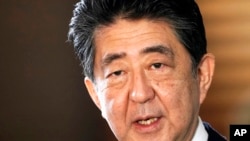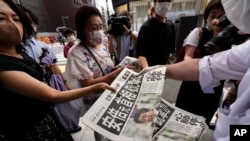Shinzo Abe, Japan’s influential former prime minister, is in serious condition after being shot in the chest during a speech Friday, according to Japanese officials.
Medical workers are rushing to save Abe’s life, an emotional Prime Minister Fumio Kishida told a press conference late Friday afternoon, local time.
Earlier Friday, Abe was speaking at a campaign event outside a train station in the city of Nara, just east of Osaka, when he was approached from behind by a man with a gun.
Following two loud blasts, Abe fell to the ground and was bleeding. Videos posted on social media appeared to show bystanders scrambling to help Abe, who was lying on the ground motionless.
The 67-year-old was taken to the hospital, where local media say his heart stopped.
Japan’s NHK broadcaster said that the alleged shooter, a 41-year-old man from Nara, has been detained. It said the man, identified as Tetsuya Yamagami, served three years in the Japanese Self-Defense Forces. The man told police that he was dissatisfied with Abe and wanted to kill him, NHK added.
Video of the shooting aftermath appeared to show a box-like weapon with two thick barrels lying on the street after the alleged shooter was detained. Media reports said the weapon appeared to be homemade.
Abe had been speaking at a small campaign event ahead of Japan’s upper house election, which will be held Sunday. Abe’s public schedule had been published a day earlier.
Kishida condemned the “sneaky barbaric” attack, saying it occurred during elections that form the very heart of Japan’s democracy. He declined to comment on the political implications of the shooting. Japanese officials have said the election will continue.
Abe is Japan’s longest-serving prime minister. He stepped down in August 2020 but has remained active in politics. He remains an influential voice in the country’s ruling Liberal Democratic Party.
Even before the shooting, Abe was expected to have a major impact on Sunday’s election, the outcome of which could be crucial not only for Japan’s economy but also its future defense posture.
Abe had been one of the most prominent voices calling for Japan to revise its pacifist constitution, which was drafted by U.S.-led Allied forces occupying the country after the World War II.
A White House spokesperson said in a statement “We are shocked and saddened to hear about the violent attack against former Japanese Prime Minister Shinzo Abe. We are closely monitoring the reports and keeping our thoughts with his family and the people of Japan.”
Rahm Emanuel, U.S. ambassador to Japan, said the United States was “saddened and shocked” by the shooting. “Abe-san has been an outstanding leader of Japan and unwavering ally of the U.S.,” he added.
U.S. Secretary of State Antony Blinken, who is attending a G-20 summit in Indonesia, said he is deeply concerned about Abe’s condition.
“Our prayers are with his family, with the people of Japan. This is a very, very sad moment,” he said.
News of the shooting rattled Japan, where it is almost impossible to buy a personal firearm and where there is very little gun violence.
Japan’s last political assassination occurred in 2007, when the mayor of Nagasaki was shot by a yakuza gangster. A Japanese Socialist Party official was also killed during a speech in 1960 by a right-wing assassin with a samurai sword.
The Abe shooting could lead to more security at Japanese campaign events, which are relatively accessible compared to many countries.
“Most Japanese have gotten quite used to being familiar and intimate with politicians. It’s part of the political culture here, the democratic culture, that you can get quite close to the politicians and listen to them and talk to them. What happened today flies in the face of all of that,” said Corey Wallace, who teaches global security courses at Yokohama's Kanagawa University.
Although Sunday’s vote will proceed as planned, most campaign events were suspended following the shooting. But Lully Miura, a political scientist at Tokyo’s Yamaneko Research Institute, said she expects most Japanese politicians will continue to be accessible at public events moving forward.
“They don’t want that. They want a freer environment, they want more handshaking and a closer relationship with the public,” she said.





